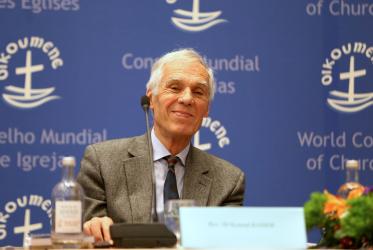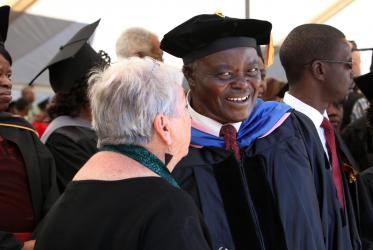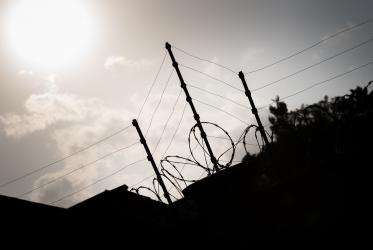Please click here to access the complete report
Preface
How will the eighth assembly of the World Council of Churches in Harare be remembered? This official report begins with the words of a litany used at the opening worship in which the central messages of the seven preceding assemblies were recalled. What has been and what will be received as the main message of this jubilee assembly at Harare?
"Being Together Under the Cross in Africa" is the title of the message adopted by the delegates on the final day of the Harare assembly. During the plenary discussion of the draft message, some delegates suggested that a more dynamic formulation than "being together" should be found -- perhaps "moving together" or "building together". Both of these phrases, which are found in the report of the assembly's Programme Guidelines Committee, raise the question: Has there been "movement" at this assembly and has it engaged in an act of "building"? The following report will help the readers, particularly those who have not participated personally in the assembly, to find out for themselves.
Each of the WCC's eight assemblies has had its particular profile which is reflected in the official report. The Harare assembly was marked by its setting on the African continent, by its theme "Turn to God -- Rejoice in Hope", echoing the biblical jubilee motif, and by the celebration of the 50th anniversary of the WCC.
Despite the broad-based and constructive participation of member churches and ecumenical partners in the nine-year process of reflection about a "common understanding and vision of the World Council of Churches", fears had been expressed prior to the assembly about the future of the World Council. Eastern Orthodox churches in particular had expressed critical concern. The following introduction and the reports adopted by the Harare assembly show that the meeting took seriously these challenges and -- in the spirit of the assembly theme -- responded with a message of hope, not only for the WCC and the ecumenical movement but for Africa and the world at large.
Two features of this assembly, which had a special significance for the participants, could not be reflected adequately in any printed report. The first is the worship life of the assembly: the daily services in the worship tent, the special liturgical celebrations and the encounters in small groups for Bible study and reflection about the presentations in plenary session. For many in Harare, these were the moments of the strongest ecumenical experience. The worship book of the assembly will remain a resource for years to come in relation to all efforts to nurture what the Programme Guidelines Committee calls an "ecumenism of the heart".
The second special feature was the Padare, the open space for sharing, encounter and dialogue in the middle of the assembly programme, with its hundreds of presentations on a wide variety of issues and experiences of local ecumenical endeavour. The Padare was linked with the official agenda of the assembly through two series of hearing sessions under the guidance of the Programme Guidelines Committee. While the experience of this innovation in the programming of a WCC assembly not surprisingly pointed to many areas in which its organization could be improved, it was on the whole most encouraging, demonstrating that the ecumenical movement is alive and full of vitality -- in spite of all the seeming evidence to the contrary.
The rich diversity of the Padare, which defied the communication efforts of report-writers and journalists, also posed difficulties of choice for the participants. Indeed, the multifaceted character of the assembly programme as a whole -- while it reflects ecumenical reality -- poses even more sharply the question of the coherence and oneness of the ecumenical movement. In a way, each participant in Harare has experienced a different assembly; and sometimes their impressions and evaluations differ so widely that one wonders whether the people concerned were attending the same conference.
This official report and the extensive introduction written by Diane Kessler provide a comprehensive perspective on the Harare assembly, both as an event and in terms of its results. We are indebted to her for putting the different and sometimes contradictory facets together and placing them into a coherent whole. This is an indispensable condition for the process of the reception of the assembly to begin. With the Harare assembly the WCC has opened a new chapter in its life. This report reflects a spirit of hopeful expectation which does not deny the difficulties and critical challenges ahead but is prepared to face them in the confidence that "the one who calls us is faithful and will carry it out" (1 Thess. 5:24).
Konrad Raiser
General Secretary
The full report "Together on the Way" is available on the website of the WCC 8th Assembly




